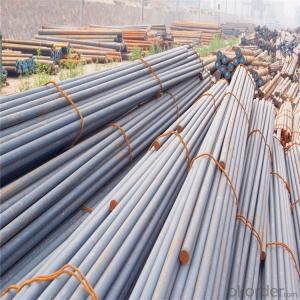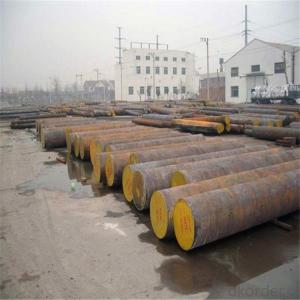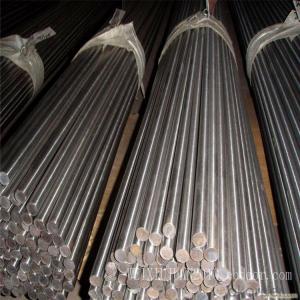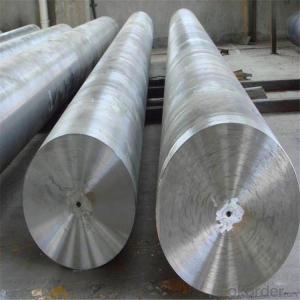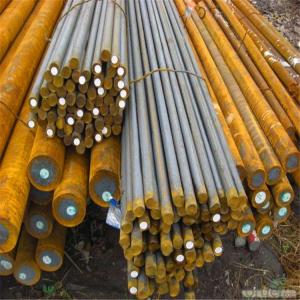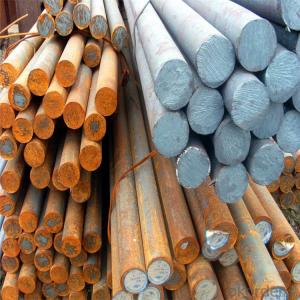ASTM1020 Carbon Structural Steel SAE1020 Steel Bar
- Loading Port:
- Tianjin
- Payment Terms:
- TT OR LC
- Min Order Qty:
- 25 m.t.
- Supply Capability:
- 500000 m.t./month
OKorder Service Pledge
OKorder Financial Service
You Might Also Like
Item specifice
ASTM1020 Carbon Structural Steel SAE1020 Steel Bar
Product Description of ASTM1020 Carbon Structural Steel SAE1020 Steel Bar
1. Steel grade: SAE1020, 20#, C22, S20C
2. Length: 6M-12M
3. Diameter: 16mm-300mm
4. Product range: round bar, flat bar, square bar
5. Technique: Hot rolled, forged, cold drawn
Specification of ASTM1020 Carbon Structural Steel SAE1020 Steel Bar
Material | SAE 1020 | Round bar | Dia(mm) | 16-300mm |
Process | EAF + LF + VD + Forged + Heat Treatment (optional) | Length (mm) | Max 12m | |
Heat treatment | Normalized / Annealed / Quenched / tempered | Flat bar | Thickness(mm) | 8-500mm |
Delivery condition | Hot forged +Rough machined (black surface after Q/T)+ Turned (optional) | Width(mm) | 70-200mm | |
Test | Ultrasonic test according to SEP 1921-84 D/d | Length (mm) | Max 12m |
Chemical Composition of ASTM1020 Carbon Structural Steel SAE1020 Steel Bar
C | Si | Mn | Cr | Ni | Cu |
0.17~0.23 | 0.17~0.37 | 0.35~0.65 | ≤0.25 | ≤0.30 | ≤0.25 |
Photo Show of ASTM1020 Carbon Structural Steel SAE1020 Steel Bar
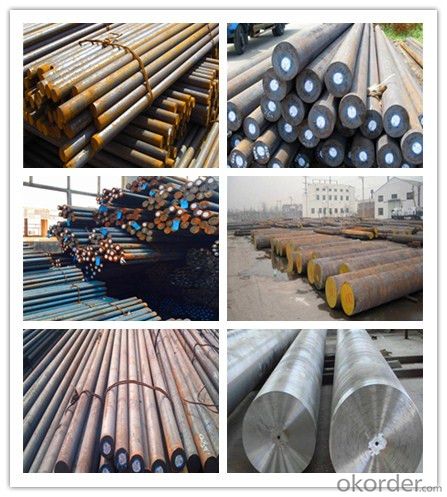
Packing and Delivery:
Packing in bundle package, or as customer's requirements.
Delivery Detail: 45 days after receiving the deposit.
Usage and Applications of ASTM1020 Carbon Structural Steel SAE1020 Steel Bar
1. Steel round bar is used in a large number of architectural and engineering structures. Or it can be used in construction of plants for the production of steel house frames, high-voltage transmission towers, bridges, vehicles, boilers, containers, ships, etc.
2. And we can use this kind of product on the performance of the mechanical parts if the demand is not very high.
3. Some special material steel round bar can be used for main shaft of steamer, hummer shank, with big section and supper force.
Company Information
CNBM International Corporation is the most important trading platform of CNBM group.
Whith its advantages, CNBM International are mainly concentrate on Cement, Glass, Iron and Steel, Ceramics industries and devotes herself for supplying high qulity series of refractories as well as technical consultancies and logistics solutions.


F A Q
1, Your advantages?
professional products inquiry, products knowledge train (for agents), smooth goods delivery, excellent customer solution proposale
2, Test & Certificate?
SGS test is available, customer inspection before shipping is welcome, third party inspection is no problem
3, Factory or Trading Company?
CNBM is a trading company but we have so many protocol factories and CNBM works as a trading department of these factories. Also CNBM is the holding company of many factories.
4, Payment Terms?
30% TT as deposit and 70% before delivery.
Irrevocable L/C at sight.
5, Trading Terms?
EXW, FOB, CIF, FFR, CNF
6, After-sale Service?
CNBM provides the services and support you need for every step of our cooperation. We're the business partner you can trust.
For any problem, please kindly contact us at any your convenient time.
We'll reply you in our first priority within 24 hours.
- Q:What is the difference between a hot-rolled and a ground steel round bar?
- The production of a hot-rolled steel round bar involves a process known as hot rolling. This process entails heating the steel above its recrystallization temperature and passing it through rollers to achieve the desired shape and size. As a result, the bar has a rough surface finish with a scaled or uneven texture. Hot-rolled steel round bars find common usage in construction, manufacturing, and general fabrication applications where a smooth finish is not a primary concern. Contrarily, a ground steel round bar goes through a process called grinding after the initial hot rolling. Grinding entails the removal of the outer layer of the hot-rolled bar to create a smooth and consistent surface finish. This process eliminates any imperfections, including scale or unevenness, resulting in a more precise and refined product. Ground steel round bars are often employed in applications where a smooth surface finish is crucial, such as in machining, toolmaking, and precision engineering. In conclusion, the primary distinction between a hot-rolled and a ground steel round bar lies in the surface finish. Hot-rolled bars possess a rough and uneven texture, whereas ground bars exhibit a smooth and consistent surface. The choice between the two depends on the specific application and the desired level of surface finish required.
- Q:Can steel round bars be used for making engine parts?
- Yes, steel round bars can be used for making engine parts. Steel is a widely used material in the automotive industry due to its high strength, durability, and heat resistance properties. Engine parts such as crankshafts, connecting rods, and camshafts can be made from steel round bars to ensure reliability and performance.
- Q:Are steel round bars suitable for marine environments?
- Steel round bars can be suitable for marine environments, but their suitability depends on the specific type of steel and the conditions of the marine environment. Stainless steel is often the preferred choice for marine applications because it possesses excellent corrosion resistance properties. This is due to the presence of chromium in stainless steel, which forms a protective layer on the steel's surface, preventing corrosion and rusting. However, not all steel round bars are suitable for marine environments. Carbon steel, for instance, is more vulnerable to corrosion in marine settings, especially when exposed to saltwater. To prevent corrosion, carbon steel needs to be carefully protected with coatings or treatments. In addition to the type of steel, the conditions of the marine environment also play a significant role in determining the suitability of steel round bars. Factors such as water salinity, exposure to chemicals, temperature fluctuations, and physical stress can impact steel's corrosion resistance. In highly corrosive marine environments, it is advisable to use specialized marine-grade stainless steel or other corrosion-resistant alloys. Ultimately, it is crucial to choose the appropriate steel grade and consider extra protective measures like coatings or galvanization to enhance the durability and longevity of steel round bars in marine environments.
- Q:How about tempering No. 45 round bar?
- Quenched and tempered steel has two major categories: carbon quenched and tempered steel and alloy quenched and tempered steel. Carbon steel or alloy steel, the control of carbon content is relatively strict. If the carbon content is too high, after quenching and tempering the strength of the workpiece is high, but the toughness is not enough, such as carbon content is too low, toughness and lack of strength. In order to make the quenched and tempered parts get good comprehensive performance, the total carbon content is controlled at 0.30~0.50%.
- Q:Are steel round bars resistant to chemicals?
- Yes, steel round bars are generally resistant to a wide range of chemicals. However, the level of resistance may vary depending on the specific type of steel and the particular chemical being used.
- Q:What are the advantages of using chromium-molybdenum alloy steel round bars?
- One of the main advantages of using chromium-molybdenum alloy steel round bars is their superior strength and durability. This type of alloy steel has excellent tensile strength and high resistance to wear and corrosion, making it ideal for various applications that require a strong and long-lasting material. Additionally, chromium-molybdenum alloy steel round bars offer good heat resistance, making them suitable for use in high-temperature environments. Overall, these bars provide a reliable and cost-effective solution for industries such as construction, automotive, and manufacturing.
- Q:What are the different grades of tool steel round bars?
- Tool steel round bars are available in various grades, each offering unique properties and characteristics to suit specific applications. Some of the different grades of tool steel round bars include: 1. W1: This is a water-hardening tool steel with relatively low carbon content. It is known for its excellent toughness and good wear resistance. W1 tool steel round bars are commonly used for cutting tools and woodworking tools. 2. O1: O1 tool steel round bars are oil-hardening tool steel with high carbon content. They have good wear resistance, high toughness, and excellent dimensional stability. O1 tool steel is often used for punches, dies, and cutting tools. 3. A2: A2 tool steel round bars are air-hardening tool steel with medium carbon and chromium content. They offer good wear resistance, excellent toughness, and high dimensional stability. A2 tool steel is commonly used for blanking and forming dies, as well as shear blades. 4. D2: D2 tool steel round bars are high-carbon, high-chromium tool steel with excellent wear resistance and good toughness. They offer high resistance to abrasive wear and are often used for making cutting tools, punches, and forming dies. 5. M2: M2 tool steel round bars are high-speed steel with a significant amount of tungsten, molybdenum, and vanadium. They have exceptional wear resistance, high red hardness, and good toughness. M2 tool steel is typically used for high-speed cutting tools, drill bits, and machining tools. 6. S7: S7 tool steel round bars are air-hardening shock-resistant tool steel. They have high impact toughness, good wear resistance, and excellent heat resistance. S7 tool steel is commonly used for applications that require high shock resistance, such as chisels and hammers. These are just a few examples of the different grades of tool steel round bars available in the market. The choice of grade depends on factors such as the specific application, desired hardness, wear resistance, toughness, and heat resistance required. It is important to consult with a knowledgeable supplier or metallurgist to determine the most suitable grade for a particular application.
- Q:What are the different types of steel round bars used in the manufacturing of bearings?
- There are several types of steel round bars that are commonly used in the manufacturing of bearings. These include: 1. Carbon steel round bars: They are durable and have good hardness, making them suitable for general-purpose bearings. 2. Chrome steel round bars: These bars have a higher hardness and better wear resistance, making them ideal for high-load and high-speed applications. 3. Stainless steel round bars: They provide excellent corrosion resistance and are commonly used in bearings for corrosive environments or food-grade applications. 4. Tool steel round bars: These bars have superior toughness and wear resistance, making them suitable for heavy-duty and high-temperature applications. Overall, the choice of steel round bar depends on the specific requirements and operating conditions of the bearings.
- Q:Can steel round bars be used in the manufacturing of bicycles?
- Yes, steel round bars can be used in the manufacturing of bicycles. Steel round bars are commonly used in various parts of bicycles, such as the frame, handlebars, cranksets, and seatposts. Steel is a durable and strong material that can withstand the stresses and strains of cycling. It is also relatively inexpensive compared to other materials like carbon fiber. Steel round bars provide the necessary strength and stability required for a bicycle's structural components, ensuring a safe and reliable ride. Additionally, steel can be easily manipulated and shaped to meet the specific design requirements of a bicycle, making it a versatile material for manufacturing. Overall, steel round bars are a popular choice in the bicycle industry due to their durability, strength, and cost-effectiveness.
- Q:What is the difference between a hot rolled and a precision ground steel round bar?
- A hot rolled steel round bar and a precision ground steel round bar differ primarily in their manufacturing processes and resulting surface finish. Hot rolled steel round bars are produced by heating the steel billet or ingot to high temperatures and then passing it through a series of rollers to achieve the desired shape and size. This process results in a rougher surface finish with visible mill-scale or oxide layers. The hot rolling process also allows for variations in size and shape, making it a more cost-effective option for producing steel round bars in large quantities. On the other hand, precision ground steel round bars undergo a more refined and controlled manufacturing process. After the initial hot rolling, the bar is then ground to achieve a smooth and consistent surface finish. Precision grinding removes the mill-scale and oxide layers, resulting in a more polished appearance. This process also ensures a tight dimensional tolerance and improved straightness of the round bar. The choice between a hot rolled and a precision ground steel round bar depends on the specific application requirements. Hot rolled round bars are typically used in applications where surface finish is not critical, such as structural components, machinery parts, or construction materials. Precision ground steel round bars, on the other hand, are utilized in applications where a smooth surface finish, precise dimensions, and tight tolerances are necessary, such as in the manufacturing of precision tools, machinery components, or in industries like aerospace or automotive. In summary, the main difference between a hot rolled and a precision ground steel round bar lies in their manufacturing processes and resulting surface finish. Hot rolled round bars offer cost-effectiveness and versatility, while precision ground round bars provide a smoother surface finish, tighter tolerances, and improved dimensional accuracy for more demanding applications.
1. Manufacturer Overview |
|
|---|---|
| Location | |
| Year Established | |
| Annual Output Value | |
| Main Markets | |
| Company Certifications | |
2. Manufacturer Certificates |
|
|---|---|
| a) Certification Name | |
| Range | |
| Reference | |
| Validity Period | |
3. Manufacturer Capability |
|
|---|---|
| a)Trade Capacity | |
| Nearest Port | |
| Export Percentage | |
| No.of Employees in Trade Department | |
| Language Spoken: | |
| b)Factory Information | |
| Factory Size: | |
| No. of Production Lines | |
| Contract Manufacturing | |
| Product Price Range | |
Send your message to us
ASTM1020 Carbon Structural Steel SAE1020 Steel Bar
- Loading Port:
- Tianjin
- Payment Terms:
- TT OR LC
- Min Order Qty:
- 25 m.t.
- Supply Capability:
- 500000 m.t./month
OKorder Service Pledge
OKorder Financial Service
Similar products
New products
Hot products
Related keywords
